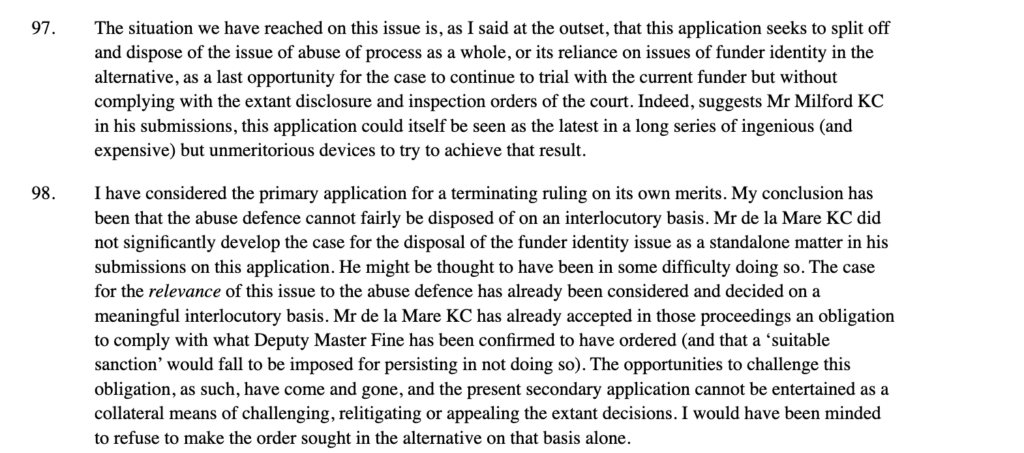A very strange High Court decision was just published – Webster v HMRC. It reveals that an unknown person or company is engaged in an international strategic litigation campaign to block international tax and transparency initiatives, and is going to great lengths to remain anonymous.
On the face of it, this case is about FATCA.
It used to be easy to evade tax on your income. Open an offshore bank account, put your money in that, and HMRC would likely never find out.
That changed in the mid-2010s. The US created FATCA, which forced governments all over the world to require their banks to report US citizens’ bank accounts to the IRS. The rest of the world first complained this was outrageous, Yankee imperialism, then decided it was a brilliant idea.
The outcome was the OECD common reporting standard (CRS), which does much the same thing for most countries in the world.1At least the developed world, there are frustrating and complex obstacles in the way of comprehensive account disclosure to the developing world. On the face of it, Ms Webster is seeking a declaration that HMRC’s reporting of her UK bank accounts to the US was unlawful. But the implications are very wide. If she succeeded, it’s likely that reporting under CRS would also be unlawful. And if a UK court reached that view, we could easily see courts across the world, striking FATCA and CRS legislation down. This would be a disaster.
It became clear in the course of Ms Webster’s litigation that her claim was funded by an anonymous third party which was running “an international strategic data protection litigation campaign” seeking to block the implementation of tax and transparency measures:

This could be someone with a genuine ideological belief that an individual right to privacy is more important than countering tax evasion (a kind of libertarian equivalent of the Good Law Project). But it is also possibly something more sinister: a person with something to hide, using this litigation to block the rules that prevent its secrets from being uncovered – that would (of course) be entirely improper. So HMRC added abuse of process to its defence, and obtained a court order seeking disclosure of the identity of the funder.
At which point Ms Webster said she didn’t know – only her lawyers, Mishcon de Reya, knew the identity of the funder.

This judgment concerns an attempt by Ms Webster (or, more likely, her funder) to strike out the abuse of process defence, so the funder’s identity doesn’t have to be disclosed.
It did not go well:

Indeed the judge, Mrs Justice Collins Rice, seemed rather concerned at what was going on:

So it seems either the mysterious funder will have to step out of the shadows, or the case will have to be dropped. A successful appeal against this judgment is unlikely.
Which begs the question: who is the mysterious funder, and what else are they up to in their “international strategic litigation” to block tax and transparency initiatives?
We don’t have to look very far. The biggest reversal to recent transparency initiatives was the 2022 decision of the CJEU to block public disclosure of beneficial ownership of companies across the EU.2One advantage of Brexit is that the UK isn’t bound by the (terrible) CJEU decision, and won’t be following it. And the law firm involved in that?

So we don’t know who is behind this campaign, and we don’t know what else they’re up to, but it’s a reasonable inference that they’ve had one huge success already.
Photo by Tarik Haiga on Unsplash
- 1At least the developed world, there are frustrating and complex obstacles in the way of comprehensive account disclosure to the developing world.
- 2One advantage of Brexit is that the UK isn’t bound by the (terrible) CJEU decision, and won’t be following it.


11 responses to “The secret campaign to block international tax transparency initiatives”
The lawyer behind this litigation just did a big interview criticizing his critics(Dan among them) and the HMRC.
https://www.youtube.com/watch?v=fxvBQBlp55I
oooh very interesting – thank you!
FATCA is unnecessarily burdensome and requires irrelevant transparency. Why should a UK trust (or company) with no connections to the USA *at all* have to register for a GIIN just because it meets the definition of a financial institution? Requiring registration in these situations is ludicrous. That doesn’t mean I’m thrilled by ‘anonymous funders’ but as a wider point, FATCA could do with a reasonableness check.
It’s a shame that this case has been blocked. Whilst not questioning the policy of international information exchange, there is no doubt that both FATCA and CRS have been implemented in such a way as to deny or inhibit banking and other financial services to a vast number of people – especially those who have a personal or business need for a bank account or a mortgage in a country other than that in which they are relevant. A review of the implementation of the policy – which has been for over the top in many cases as it has made banks and others so risk averse as to shy away from doing business with anyone whose circumstances depart from the norm – would accordingly be a very good thing!
Is that still the case now? It was definitely an issue when FATCA was new, and many financial institutions hadn’t implemented systems to deal with it. But now we have CRS, with kinda sorta equivalent systems required, are UK financial institutions really rejecting US clients but accepting e.g. French ones?
I suggest a large part of that is due to the attitude of the banks rather than the law itself, although those banks then blame the law for their decisions.
Quite possibly nefarious players behind this. But…glibly framing FATCA as “good thing” is questionable. It’s a very expensive, Owellian nightmare for many US citizens overseas with modest incomes who just want to live their lives. As well as onerous reporting requirements it makes pensions, shares, being company directors and other things either impossible or practically impossible due to the potential consequences of innocent mistakes. If this or a similar court case forces a rethink, that would be a good thing
FATCA, at least in its effects on individual citizens living abroad, is an example of good intentions marred by bad law drafting. It wasn’t the intent to catch the average Joes and Janes in the onerous IRS reporting net. But the bill Congress passed was clumsy and ill-considered. No one since has had the courage to go back and fix its issues.
I agree, MG. American tax imperialism is egregious.
But isn’t that fundamentally due to the US taxing on citizenship basis?
If they taxed on residence like most of the world, FATCA would be largely proportionate?
It looks like WealthBriefing covered this a bit:
https://www.wealthbriefing.com/html/article.php?id=190256#.YXqOqZ7MKM8
https://www.wealthbriefing.com/html/article.php?id=192801
https://www.wealthbriefing.com/html/article.php/Mishcon-takes-legal-steps-against-CRS-and-beneficial-ownership-registers